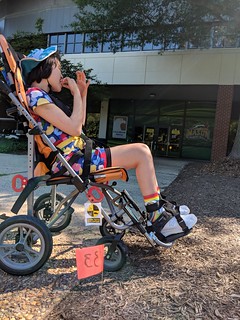Rett Syndrome
Rett syndrome (RTT) is a genetic brain disorder that becomes evident after 6–18 months of age, primarily affecting females. It results from mutations in the MECP2 gene on the X chromosome. RTT is characterised by impairments in language and coordination, slower growth, smaller head size, and repetitive movements. Complications include seizures, scoliosis, and sleeping problems. Males with this mutation typically do not survive infancy.

Signs and Symptoms
RTT progresses through four stages:
Stage I: Early Onset
This stage begins between 6 and 18 months of age and is often overlooked. Symptoms include reduced eye contact, decreased interest in toys, and delays in gross motor skills. Hand-wringing and slower head growth may occur. This stage usually lasts several months to a year.
Stage II: Rapid Destructive Stage
Starting between ages 1 and 4, this stage lasts for weeks to months. It is marked by the loss of purposeful hand skills and spoken language. Characteristic hand movements like wringing, clapping, and mouthing begin. Autistic-like behaviours, irregular breathing, and unsteady walking also appear.
Stage III: Plateau or Pseudo-Stationary Stage
This stage begins between ages 2 and 10 and can last for years. Motor problems, seizures, and apraxia are prominent, but behavioural improvements such as better alertness and communication occur. Many individuals remain in this stage for life.
Stage IV: Late Motor Deterioration Stage
This stage can last for years or decades and is marked by reduced mobility, scoliosis, muscle weakness, rigidity, and abnormal posturing. Cognitive, communication, and hand skills generally do not decline further.

Diagnosis
Diagnosis involves close observation of the child's growth and development. Criteria for diagnosis include decreased head growth, loss of fine motor skills, speech, and repetitive hand movements. Conditions like traumatic brain injury and neurometabolic diseases must be ruled out. Genetic testing for the MECP2 mutation confirms the diagnosis but is not solely sufficient.
Differential Diagnosis
RTT shares symptoms with autism and cerebral palsy, such as screaming fits, lack of eye contact, and motor difficulties. However, RTT is distinguished by its unique hand movements and loss of acquired skills following a period of normal development.
Cause
RTT is primarily caused by mutations in the MECP2 gene on the X chromosome. These mutations are usually de novo, meaning they occur spontaneously rather than being inherited. Less than 1% of cases are inherited, following an X-linked dominant pattern.
Mechanism
The MECP2 protein is involved in transcriptional silencing and epigenetic regulation of methylated DNA. The loss of MECP2 function affects various neuronal pathways, including noradrenergic and dopaminergic systems, contributing to the neurodevelopmental symptoms of RTT.
Treatment
There is no cure for RTT. Treatment focuses on symptom management and improving the quality of life. A multi-disciplinary approach is essential, involving primary care physicians, physical therapists, occupational therapists, speech-language pathologists, and nutritionists. Interventions may include special education, leg braces, anticonvulsants for seizures, and scoliosis management.
Given the increased risk of sudden cardiac death, annual EKG screenings are recommended. If long QT syndrome is detected, anti-arrhythmic medications like beta-blockers or phenytoin are used. Breathing irregularities are managed with rebreathing techniques, oxygen delivery, or non-invasive ventilation.
In 2021, a phase 3 trial of trofinetide, a potential treatment for RTT, showed positive results. The FDA approved this drug in March 2023.

Prognosis
Males with RTT usually die within the first two years, unless they have extra X chromosomes or somatic mosaicism. Females can live into middle age or beyond. Causes of death in RTT patients often include sudden brainstem dysfunction, cardiac arrest, seizures, or gastric perforation.
History
Rett syndrome was first described by Austrian paediatrician Andreas Rett in 1966, but it gained wider recognition after Swedish paediatrician Bengt Hagberg published an article in English in 1983. The genetic mutation causing RTT was discovered by Huda Zoghbi in 1999.
Research
Gene therapy is being looked at to achieve regulated expression of a functional MECP2 gene. In March 2022, Taysha Gene Therapies received approval from Health Canada for a clinical trial of their investigational gene therapy for adult females with RTT.
Self-assessment MCQs (single best answer)
What gene mutation is primarily responsible for Rett syndrome (RTT)?
Which stage of RTT is marked by the loss of purposeful hand skills and spoken language?
At what age does the Early Onset stage of RTT typically begin?
What is a common characteristic behaviour observed in individuals with RTT?
What is the primary focus of treatment for RTT?
Which of the following is NOT a common complication of RTT?
What is the prognosis for males with the MECP2 mutation causing RTT?
Who first described Rett syndrome?
What year was the genetic mutation causing RTT discovered?
What type of clinical trial did Taysha Gene Therapies receive approval for in March 2022?
Dentaljuce
Dentaljuce provides Enhanced Continuing Professional Development (CPD) with GDC-approved Certificates for dental professionals worldwide.
Founded in 2009 by the award-winning Masters team from the School of Dentistry at the University of Birmingham, Dentaljuce has established itself as the leading platform for online CPD.
With over 100 high-quality online courses available for a single annual membership fee, Dentaljuce offers comprehensive e-learning designed for busy dental professionals.
The courses cover a complete range of topics, from clinical skills to patient communication, and are suitable for dentists, nurses, hygienists, therapists, students, and practice managers.
Dentaljuce features Dr. Aiden, a dentally trained AI-powered personal tutor available 24/7 to assist with queries and provide guidance through complex topics, enhancing the learning experience.
Check out our range of courses, or sign up now!


